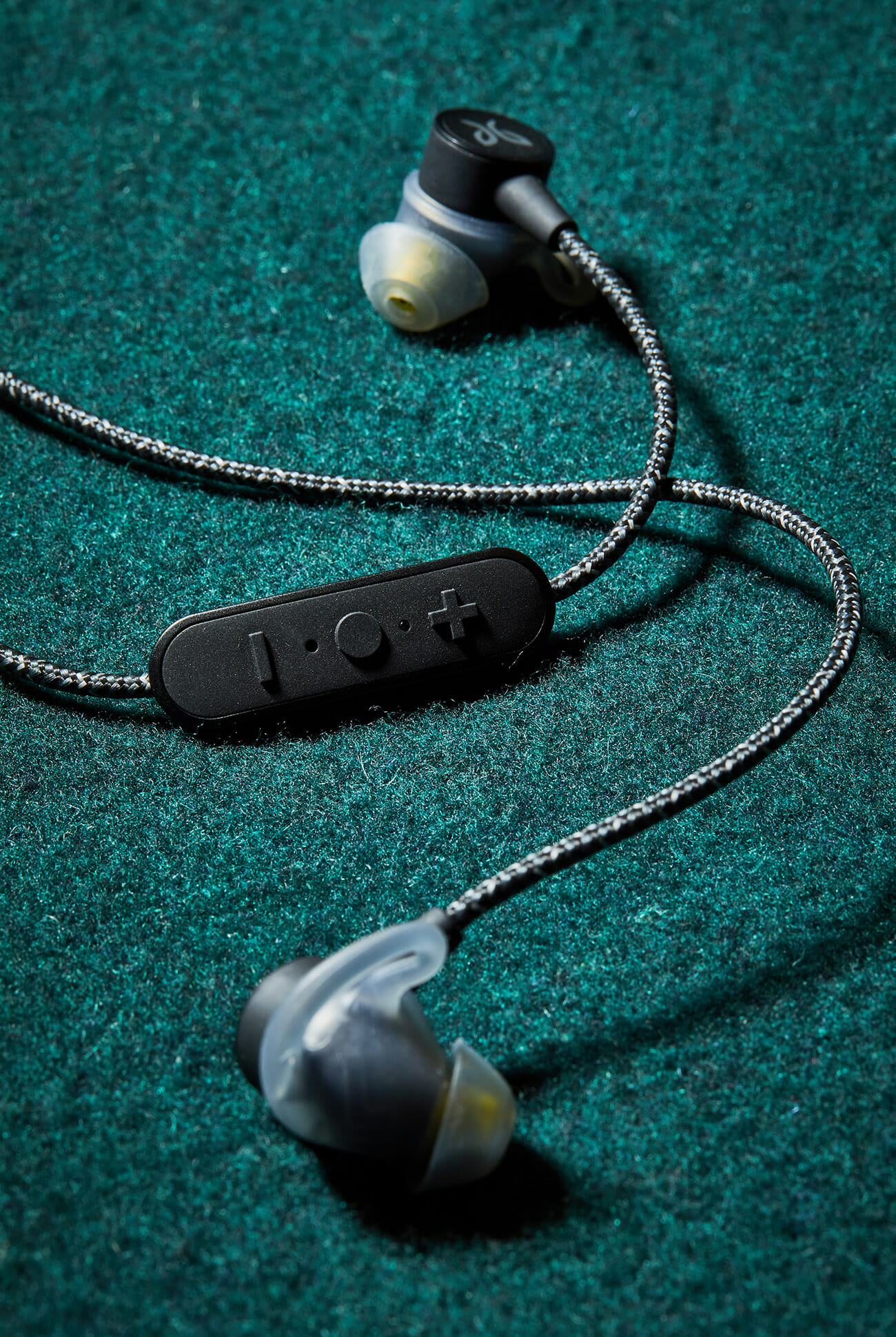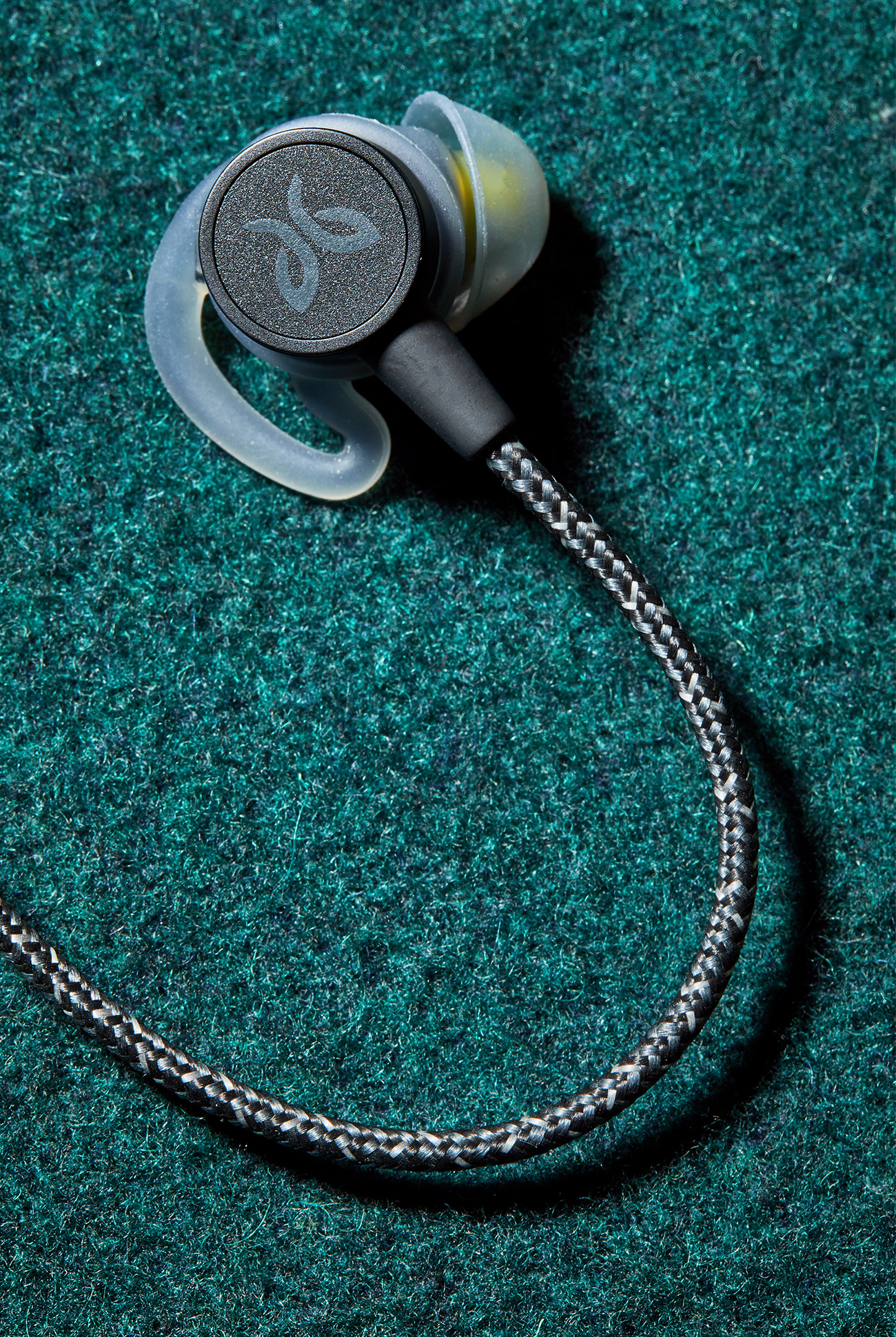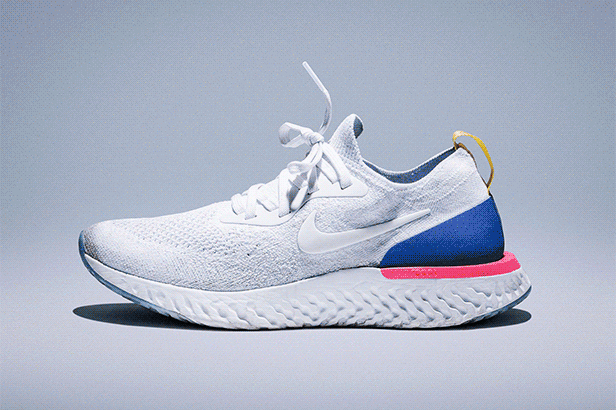In 2018, Jaybird focused on expanding its well-received line of sport headphones beyond its true-wireless Run and its X4 neck buds (wireless earbud-style headphones that are joined with a cord). It did that by introducing an affordable entry-level headphone called Tarah and shortly after that, by revealing the Tarah Pro, its highest-end pair of neck buds.
The Good: To distinguish the Tarah Pro as a high-end headphone, Jaybird thoughtfully upgraded them in almost every way. The cord is woven instead of rubberized, which has a better feel and also helps prevent tangling and snagging. The back of each earbud contains a magnet so that the headphones can be worn securely like a necklace when not in use. When a runner puts the headphones together in this way, music automatically pauses and resumes automatically when they are separated again.
Jaybird also constructed each Tarah Pro earbud so that it can swivel to accommodate two styles of wear: with the cord dangling below the chin, and with the cable running up and behind the ears and around the back of the head.
But the best aspects of the Tarah Pro are its EQ adjustability and its battery. With the Jaybird app, users can tweak tone levels to get precisely the sound they desire, but now they can also build a personal EQ by going through a series of hearing tests (it only takes a few minutes and involves moving a set of sliders based on how you hear various tones). Then there’s the big one: the battery. The Tarah Pro will last up to 14 hours on a single charge, which makes them suitable for ultra runners who might be out for that long. For the rest of us, it means that we don’t have to remember to charge them multiple times per week. When you do need some last-minute juice though, a new quick-charge feature will give you two hours of playback after just five minutes of refueling.
Who It’s For: Runners. Especially long distance runners, and runners wary of switching to wireless headphones and having another gadget to remember to charge before heading out for a jog.

Watch Out For: At $160, Jaybird’s Tarah Pro aren’t exactly cheap. They’re more expensive than Jaybird’s true wireless Run headphones, and there are plenty of other wireless running headphones available for less. None match the Tarah Pro in battery life though.
Alternatives: Wireless technology has brought us into a golden age of sport headphones, and there are many worthy alternatives to Jaybird’s Tarah Pro. For our full list, see our guide to the Best Wireless Running Headphones.
Review: Earlier this year, The New York Times published an essay penned by Peter Sagal, an NPR radio host titled, “The Case Against Running With Headphones.” For Sagal, running without audio input from music or podcasts frees him from distraction and allows him to focus on how his body is feeling; “the only way to succeed as a long-distance runner is to do it mindfully, to be aware of the body and the world it is moving through,” he writes.
After this article was shared amongst Gear Patrol’s runners, a debate kicked off. “I can’t run without music. I lose 80% motivation without it,” one writer contended. Another was more equitable: “The ‘throw your tech out the window’ option is tempting in its simplicity, but the fact of the matter is that running with music/headphones can be great. Just not all the time.”
I, like Sagal, have wavered back and forth between running with headphones and without (his old race day playlists always started with Springsteen’s “Born to Run”). For the past few years, I’ve opted to run without, mostly because my iPod is obsolete, but more importantly because I detested the idea of running with my phone. This fact in particular sums up my stance on running: I like to keep it simple, I do not like to bring additional items that add more steps to my routine.

But recently, as I was training to run my first marathon and began venturing out on longer runs, often on remote roads far from town, I started to carry my phone as a safety precaution should anything go wrong. And once I conceded to that, I figured I might as well listen to it too.
Throughout my training and the race itself, Apple’s in-the-box corded earbuds were my headphones of choice. Why? Because they’re basic, comfortable, and because they came with my phone and didn’t cost me anything. I’ve gone through two other cheap-ish pairs in the last year — one broke moderately quickly, and the other had a miserable fit and kept popping out. Apple’s aren’t perfect, but made the best argument for performance-for-value.
All this is to say that I’m not someone who’d be interested in a pair of high-end wireless sport headphones. Not because I’m sentimental toward a technological past represented by the cord that connects me to my phone but because I don’t want to have to download an app or have another gadget to remember to charge before heading off on a run — especially not one that costs so much I’d be disconsolate if I were ever to lose it. But I like Jaybird’s Tarah Pro headphones. A lot.
Let’s forget about the $160 price tag for a moment, which is my only point of abrasion in considering these headphones. Everything about them is designed for someone like me, someone who wants to run with music (but maybe not all the time) and for that reason wants a pair of headphones he can forget about once the shoes are laced up.
Even some of the very things I knew that I was apprehensive about turned out to be great. The Jaybird app is one — it sits mostly unused on my very last screen, but I did employ it to set the personalized EQ levels on my headphones, which has turned out to be pretty awesome. I also flipped through the how-to guides, which is where I learned that I had to swivel the buds to wear them over and behind my ear (but only after attempting to run four frustrating miles without doing so). I’ve found this method provides the best fit, particularly with the rubber cinch also applied (Jaybird calls this removable little bead “Speed Cinch”).
The other pressure point I assumed I’d run up against is the battery, which is where the Tarah Pro excels. I’ll be frank; I didn’t perform any comprehensive test in which I continuously played music through my pair to time how long they last. Jaybird claims they’ll go for up to 14 hours — I’ve yet to bottom out on mine. I’ll likely never go on a 14-hour run either, and that two hours of runtime can be gained from just five minutes on the charger (which uses magnets instead of a port) means that if I do ever drain them completely, I can plug them in last minute while I stretch and leave with power but more importantly, without interrupting my routine.
The Tarah Pro’s gels are comfortable in my ears — they come with three different sizes — and the woven cord both feels premium and doesn’t snag in my hair the way rubber ones do. Each earbud has a magnet inside its driver so that if I need to take them out of my ears, they can be worn like a necklace. This also activates a very handy function — when I connect them, my music automatically pauses and when I separate them, it resumes after a few seconds, which is just enough time to get them back in my ears. They also turn off automatically after five minutes of paused audio, aiding in battery retention. (In my opinion, every pair of wireless headphones should do this.)
Whether or not all of these things add up to $160 in value is up to you. For me, that total is a pair of headphones that are invisible before, during and after a run; they don’t force my attention to charging or syncing or shoving them back into my ear every quarter mile. I’m left to listen to my music and think about my pace, stride and breathing. So for me, and maybe Sagan would agree, the answer has been yes.
Verdict: With the Tarah Pro headphones, Jaybird has rounded out its line of sport earbuds. There’s a lot to like here: a super-long 14-hour battery life, fast charging that provides two hours of playback after five minutes plugged in and custom EQ top the list. These things come at a price though, and some might opt for similarly-priced high-end true wireless headphones instead. For me, it’s the little details — the fit, the cord, the magnetic-auto-pause function — that allow these headphones to integrate into my running routine without interrupting it that make them worth the cost.
What Others Are Saying:
• “Sure, Jaybird does offer some more affordable options, and for $20 more you could nab the company’s true wireless Run model. With the Tarah Pro, the combination of extra battery life, the Switch Fit design and the custom EQ hearing test should ease any hesitation about spending some extra coin.” — Billy Steele, Engadget
• “he Tarah Pro is the clearly the best of Jaybird’s models and a very good wireless sports headphone. However, with all the competition, as well as totally wireless earphones like Apple’s AirPods and Jabra’s Elite Active 65t costing around the same price, I do think it should come down in price by $20 to $30. Perhaps in time it will.” — David Carnoy, Cnet
Key Specs
Battery Life: up to 14 hours
Waterproof Rating: IPX7 (waterproof up to 3ft)
Impedance: 16 Ohm
Driver: 6mm
Frequency Response: 20Hz – 20kHz
Total Harmonic Distortion: <5% (1KHz, 1mW)
Jaybird provided this product for review.

Hot takes and in-depth reviews on noteworthy, relevant and interesting products. Read the Story




